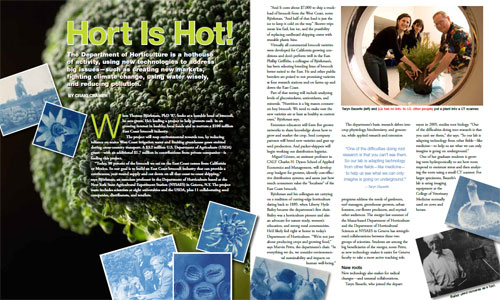
The Department of Horticulture is featured in Hort Is Hot!‘ in the spring 2011 issue of CALS News. The article profiles some of the ‘hot’ projects in the department, including Thomas Bjorkman’s East Coast broccoli project, David Wolfe’s climate change work, Taryn Bauerle’s use of CT imaging to study roots, and Jenny Kao-Kniffin’s work developing weed-suppressive landscapes.
If you read the article and are looking for follow-up links on these projects and the other innovative work listed in the sidebar, here they are:
Main story:
- Developing an Eastern Broccoli Industry | Thomas Björkman profile page | Thomas Björkman Lab page
- David Wolfe profile page | Cornell Climate Change | Northeast Climate Impacts Assessment | Climate change and Northeast agriculture
- Taryn Bauerle profile page | Taryn Bauerle Lab page
- Jenny Kao-Kniffin profile page
Sidebar:
- Cornell Orchards — a working orchard complete with a sales room adjacent to campus — “constantly reminds us that our work is closely tied to consumers,” says department chair Marvin Pritts.
- Urban Eden students plan and plant landscapes around campus every spring, applying what they’ve learned about trees and shrubs in class. Some students join SWAT teams (Student Weekend Arborist Teams) to help cities and towns inventory their street trees.
- Distance learning courses for the general public in organic gardening, plant propagation, botanical illustration, and how to get started in farming provide the best of hands-on and online learning.
- Vegetable Varieties for Gardeners website is a popular citizen science project that helps people decide what to grow. Visitors can create garden profiles to showcase their gardens, review varieties, and communicate with each other on Facebook.
- Willowpedia is a new website focusing on use of shrub willows as a sustainable feedstock crop for biofuels and other products.
- The Nature of Plants instructor Taryn Bauerle teams with Cornell Outdoor Education to expose freshmen to plant biology while they climb and hang from ropes in mature forest trees.
- Food donations to local food banks and pantries from the Thompson Vegetable Research Farm in Freeville and other facilities topped 1 million pounds since 2004.
- Viticulture and enology majors design management plans for the organic vineyard at Cornell Orchards during spring semester, carry out the plan during summer internships, and make wines from the grapes in fall. (More on sustainable wine at Cornell.)
- A 2010 study by the National Research Council ranks Cornell’s Graduate Field of Horticulture second out of the 18 horticulture programs in the plant science category.
- Experiential Garden-Based Learning in Belize course sends teams of students and extension educators to demonstrate how gardens can enrich school curricula. View video.
- Hortus Forum, Cornell’s undergraduate horticulture club, raises money for educational field trips by growing and selling poinsettias and other plants on campus.
- The Turfgrass Program uses weekly podcasts to help lawn, golf, and athletic turf professionals reduce their environmental impact.
- The Cornell Small Farms Program, housed in the department, reaches more than 27,000 farmers with its Small Farm Quarterly in collaboration with Lee Publishing.


